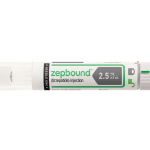Disappointment As Study Reveals Weight Regain in Patients After Discontinuation of Eli Lilly’s Zepbound

In a significant development, the full results of a study published in the journal JAMA on Monday have unveiled that patients undergoing treatment with Eli Lilly’s weight-loss drug Zepbound experienced substantial weight regain nearly a year after discontinuing the treatment. The study focused on patients who were obese and without diabetes, revealing a 14% weight regain within the 52-week period after transitioning from an eight-month course of Zepbound to a placebo.
The data further indicated that those who continued the Zepbound treatment during the same period experienced an additional 5.5% weight reduction. This noteworthy finding has implications not only for individuals seeking weight loss solutions but also for Eli Lilly’s market performance, as shares of the company fell over 4% in morning trading following the release of the study results.
Zepbound, also known as tirzepatide, is a drug designed for weight loss and is marketed under the brand name Mounjaro for type 2 diabetes. Alongside similar drugs such as Novo Nordisk’s Wegovy and Ozempic, Zepbound belongs to a class of treatments targeting the GLP-1 hormone. This hormone plays a crucial role in inducing feelings of fullness in the body after meals, making it a key component in obesity and weight loss treatments.
The study’s findings raise concerns about the long-term effectiveness of GLP-1-based weight-loss drugs. Patients who discontinued the use of such medications, including Wegovy, were noted to be at risk of regaining their original body weight in approximately five years, as reported by a Novo Nordisk official in March. This suggests a potential challenge in maintaining weight loss over an extended period, emphasizing the need for continuous therapy.
Eli Lilly had previously released partial details from the trial in July, prompting analysts to highlight the importance of prolonged therapy with GLP-1 drugs for sustained effects. Goldman Sachs analysts, in particular, noted the necessity for additional longer-term data to assess the potential effects of tirzepatide and other incretin-based therapies over multiple years, considering the risk of a diminishing response to such drugs.
The comprehensive results of the study revealed that over the entire treatment period of 88 weeks, patients who continued with Lilly’s Zepbound showed an impressive 25.3% weight loss. In contrast, those who switched to a placebo after 56 weeks experienced an overall weight reduction of 9.9% during the entire study period. This disparity underscores the potential impact of continuous therapy on the sustained efficacy of Zepbound and similar medications.
As the study sheds light on the complexities of maintaining weight loss post-treatment, it raises crucial questions about the long-term strategies and expectations associated with GLP-1-based weight-loss drugs. Further research and extended monitoring will be essential to provide a more comprehensive understanding of the sustained effects and challenges associated with these medications.





